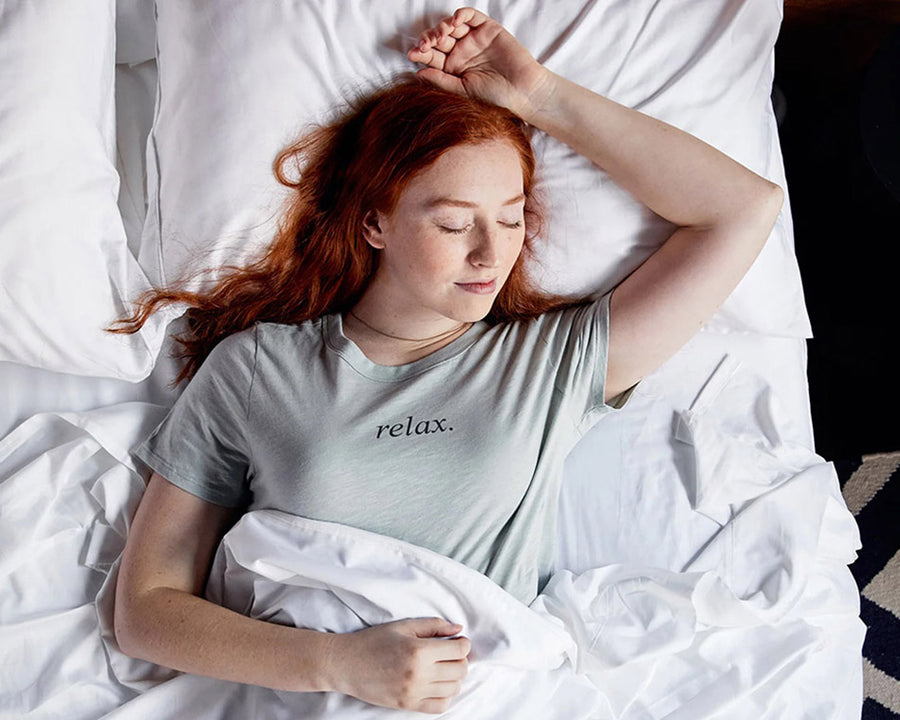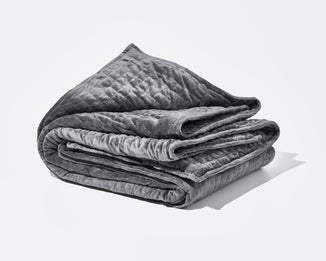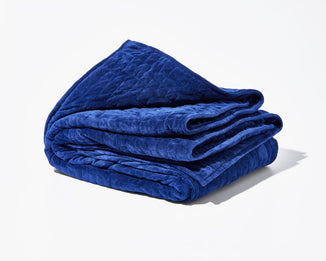
Sep 20, 2023
How to Get More REM Sleep

If you've ever wondered why you don't feel refreshed after a long night's sleep, the answer might lie in your REM cycles. Rapid Eye Movement (REM) sleep is a necessary component of your sleep architecture, serving vital functions that contribute to your emotional, cognitive and physical well-being. A lack of REM sleep can lead to more than just grogginess — it can affect your mood, memory and even your health. We’ll explore the science of REM sleep, its essential role in our lives and practical ways to achieve more of it for a balanced and healthy lifestyle.
Try a Weighted Blanket for Better SleepWhat Is REM Sleep?
REM sleep, short for Rapid Eye Movement sleep, is a specialized stage in the sleep cycle marked by a flurry of eye movements, significantly reduced muscle activity and a higher likelihood of vivid dreams. This phase is not merely an interlude between periods of deep sleep but a dynamic state where the brain is buzzing with activity. It's no surprise that questions about how to get more REM sleep are common, given its importance for various cognitive functions. PGO waves, short for ponto-geniculo-occipital waves, signal the onset of REM sleep, originating from the brain stem and serving as a gateway to this unique sleep stage.
During REM sleep, the body undergoes a dramatic shift in physiological norms, including respiration and body temperature variances. This stage disrupts central homeostasis, permitting broad fluctuations that aren’t seen in other sleep stages or even wakefulness. The body experiences a loss of muscle tone, known as REM atonia, which is a crucial safeguard against acting out dreams. If you've ever wondered why REM sleep is important, it's partly because it serves vital roles in emotional regulation and memory consolidation.

While non-REM sleep is geared more toward physical restoration, REM sleep has an intellectual and emotional focus. The eye movement that is so characteristic of this stage doesn't send any visual cues to the brain, adding to the paradoxical nature of REM sleep — high brain activity without external sensory input. Understanding your REM cycle could be a stepping stone to improved sleep quality and mental health, and sleep researchers continue to study its impacts. So, whether it's optimizing your bedtime routine or investing in the best mattress, finding ways to get more REM sleep could be beneficial for both your body and mind.
REM Sleep and Emotional Regulation
REM sleep plays a significant role in emotional regulation, and research has shown that it can help you process and regulate your emotions more effectively. Here are some ways in which researchers believe REM sleep works for emotional regulation:
REM Sleep for Balance and Calm
REM sleep acts like an emotional thermostat, helping to balance and calm your emotions for when you're awake.
Studies have shown that REM sleep after stress can function as a regulatory mechanism of waking emotional arousal. Waking emotional arousal refers to the state of being physiologically alert, awake and attentive, and it is primarily controlled by the brain. During REM sleep, the brain processes and consolidates emotional memories, which can help to reduce the intensity of emotional responses during waking hours.
Additionally, it has been proposed that adrenergic reduction during REM sleep is essential to emotional regulation because of its role in defusing emotional arousal. Adrenergic reduction refers to the decrease in the activity of the sympathetic nervous system, which is responsible for the "fight or flight" response in the body. This means that REM sleep helps to reduce the intensity of emotional responses, making it easier for you to regulate your emotions.
Essentially, when you're stressed or emotionally charged while awake, getting good REM sleep helps your brain sort through those feelings. During REM sleep, your body dials down the "fight or flight" response, making it easier for you to handle your emotions when you wake up. By doing this, you're more likely to feel less emotionally intense or reactive the next day.
REM Sleep for Processing Distressing Emotions
Struggling with overwhelming emotions or stress? Quality sleep, which includes adequate REM, might be more important than you think. REM sleep may help you manage those tough emotions, offering mental relief.

Studies have shown that uninterrupted REM sleep is critical in decreasing the neural activity associated with a distressing emotion. This means that REM sleep helps you to process and regulate distressing emotions, which can be particularly helpful for those suffering from insomnia, childhood adversity, depression, anxiety or post-traumatic stress disorder.
Phrased differently, getting good REM sleep helps to dial down brain activity related to upsetting emotions, making it easier for you to cope with stress, anxiety or depression. It's especially beneficial for those dealing with sleep issues or emotional challenges.
Sleep Better with a Cooling Weighted BlanketREM Sleep and Memory Consolidation
When it comes to strengthening your memory, REM sleep is like your brain's personal filing system, helping you sort, organize and hold on to important information. Research has unveiled some fascinating ways in which REM sleep contributes to memory consolidation. Here's a deeper dive into how REM sleep is a vital component in the process of memory consolidation:
REM Sleep and Processing New Learnings and Motor Skills
During REM sleep, your brain processes new learnings and motor skills from the day, committing some to memory. Studies of both humans and animals suggest that being deprived of REM sleep interferes with memory formation.
Why is this important, you ask? Well, think about every new thing you've learned or every new physical skill you've tried to master. From the swing of a golf club to absorbing information for an upcoming exam, these things need to be consolidated in your brain for you to really get the hang of them. During REM sleep, your brain is hard at work turning those fresh learnings and new motor skills into long-term memory. That's why quality sleep is not just about physical rest. It's also crucial for your ability to learn, remember and perform.
REM Sleep for Better Working Memory
Working memory is like the notepad of your mind — it's where you jot down information you need right now but won't necessarily store long-term. While you might hear the term used interchangeably with short-term memory, they're not exactly the same. Working memory lets you play with that short-term information, rearranging and applying it as you tackle problems or make decisions. It's central to everyday tasks like following a recipe or calculating a tip and plays a vital role in reasoning, problem-solving and even guiding our behavior. So, the better your working memory, the more adept you are at juggling daily cognitive tasks.
A study involving healthy college students found that those who took a nap — and entered REM sleep during that nap — performed significantly better on working memory tasks than those who stayed awake. This suggests that REM sleep is critical for "cementing" working memory, helping you better manipulate and use short-term information.
How to Get Better REM Sleep

Develop a Sleep Schedule
Consistency is key when it comes to good sleep habits, especially REM sleep. Going to bed and waking up at the same time every day helps your body clock find its groove, making it easier for you to fall asleep and wake up naturally. This regular, healthy sleep routine improves the overall quality of your sleep, setting the stage for more fruitful REM cycles.
Avoid Stimulants
It's not just about when you sleep but what you do before hitting the hay. Consuming things like caffeine, alcohol or nicotine can throw your sleep off course. But it's not just physical stimulants you should watch out for — mind your mental stimulants, too. Avoid rigorous exercise or endless scrolling on your phone right before bedtime. These activities can interfere with your circadian rhythm, making it harder to fall asleep and can negatively affect the quality of your sleep.
Embrace Sleep Accessories
Think of sleep accessories as tools designed to optimize your sleep experience. For example, a weighted blanket can offer a sensation of gentle, even pressure, much like a hug, which can help you relax and fall asleep more easily. If you tend to run warm, try a cooling weighted blanket for better thermoregulation instead.

Infrared sauna blankets can be another excellent addition to your sleep toolkit. These specialized blankets use FAR infrared heat to help your muscles relax and to promote better blood flow, both of which can facilitate deeper sleep and potentially more REM sleep.
Create an Ideal Sleep Environment
Your bedroom should be a sanctuary designed for sleep. Make sure it's cool, dark and quiet to help you drift off quicker and enjoy better quality sleep. These conditions mimic a natural sleep setting and can boost your chances of entering those coveted REM cycles.
Leverage Supplements
Magnesium and melatonin are two supplements that may give your sleep quality a leg up. Magnesium helps regulate sleep, and melatonin can help you fall asleep faster. Both can be helpers for your natural circadian rhythm. But remember — supplements aren't a one-size-fits-all solution. Consult with a healthcare professional to tailor a regimen that's right for you.
Experiment with Sleep-Promoting Activities
Don't underestimate the power of a good pre-sleep routine. Incorporating activities like meditation, yoga or even some soothing aromatherapy can set the stage for a restful night. Just like a good sleep schedule, consistency is key. These activities aren't one-time fixes. Make them a regular part of your nightly wind-down to get the most benefit.
Address Sleep Disorders
If you find yourself stuck in a cycle of light sleep or disrupted sleep resulting in frequently waking up throughout the night, you may be dealing with a sleep disorder. Conditions like obstructive sleep apnea or neurological disorders can significantly reduce REM sleep. Utilizing a sleep tracker can offer insights into your sleep patterns, but it's essential to consult a sleep expert for a proper diagnosis and treatment plan. Addressing these issues may be the key to unlocking better REM sleep and, subsequently, improving emotional well-being and memory consolidation.
Get Enough Sleep
This may sound like stating the obvious, but it can't be overstressed: the key to getting enough REM sleep is simply getting enough sleep overall. Each night your body cycles through different sleep stages, including REM sleep. The amount of time you spend in each stage naturally balances itself out if you're getting a full night's sleep. So, skimping on hours means you're likely also skimping on some valuable REM time. To ensure you're giving your body the time it needs to restore and rejuvenate fully, aim for seven to nine hours of quality sleep each night.
Frequently Asked Questions About REM Sleep
Which is better: REM or deep sleep?
REM sleep and deep sleep serve different but equally important functions in your overall well-being. Aiming for a balance of approximately 25 percent REM and 25 percent deep sleep within your sleep stage distribution can help you reap the various cognitive and restorative benefits. Keep in mind that sleep quality isn't about choosing between REM and deep sleep — it's about achieving a balanced sleep cycle.

Is a lack of REM sleep bad?
Having insufficient REM sleep can compromise memory formation, according to multiple studies on both humans and animals. It's important to realize, however, that these memory issues may stem from overall sleep disruption. Sleep deprivation and fragmented sleep patterns often accompany insufficient REM sleep, making it imperative to address sleep quality as a whole.
How many hours of REM sleep do you need?
For better sleep, adults should aim for seven to nine hours a night, with about 90 minutes or 20-25 percent of that time dedicated to REM sleep. A typical night will include three to five REM cycles, each increasing in length as the night progresses. Aligning this with a consistent sleep schedule and good sleep hygiene practices can go a long way in improving your overall sleep quality and mental health.
Final Thoughts on REM Sleep
While achieving more REM sleep might seem elusive, understanding its impact on your emotional regulation, memory consolidation and overall wellness can be motivating. Just like a balanced diet, quality sleep, including adequate REM cycles, is vital for your overall well-being. Implementing a consistent sleep schedule, optimizing your sleep environment and making smart lifestyle choices are actionable steps that anyone can take. Remember, the benefits of REM sleep extend far beyond the boundaries of your mattress. Its ripple effects can improve your emotional resilience, cognitive sharpness and long-term health. So why settle for just "sleep" when you can aim for quality restorative slumber?

Your use of this website, its content, and any products obtained through this website is at your own risk. This website, its content, and any products obtained through this website are provided on an “as is” basis, without any warranties of any kind, either express or implied, including warranties of merchantability, infringement of intellectual property, or fitness for any particular purposes. No warranty or representation is made with respect to the completeness, reliability, quality, or accuracy of this website or its content. This website, its content, and any products obtained through this website do not constitute medical treatment and is not a substitute for a medical examination or diagnosis. If you are dealing with a health condition check with your health care provider before using. This website may contain affiliate links that allow us to earn a commission on purchases made through such links. We may accept forms of advertising or sponsorships in connection with this website. There might also be paid topic insertions. We may accept and keep free products, services, and other forms of compensation from others.
Image Credits:
mavo/Shutterstock.com
Prostock-studio/Shutterstock.com
Dalaifood/Shutterstock.com
davooda/Shutterstock.com
G-Stock Studio/Shutterstock.com



